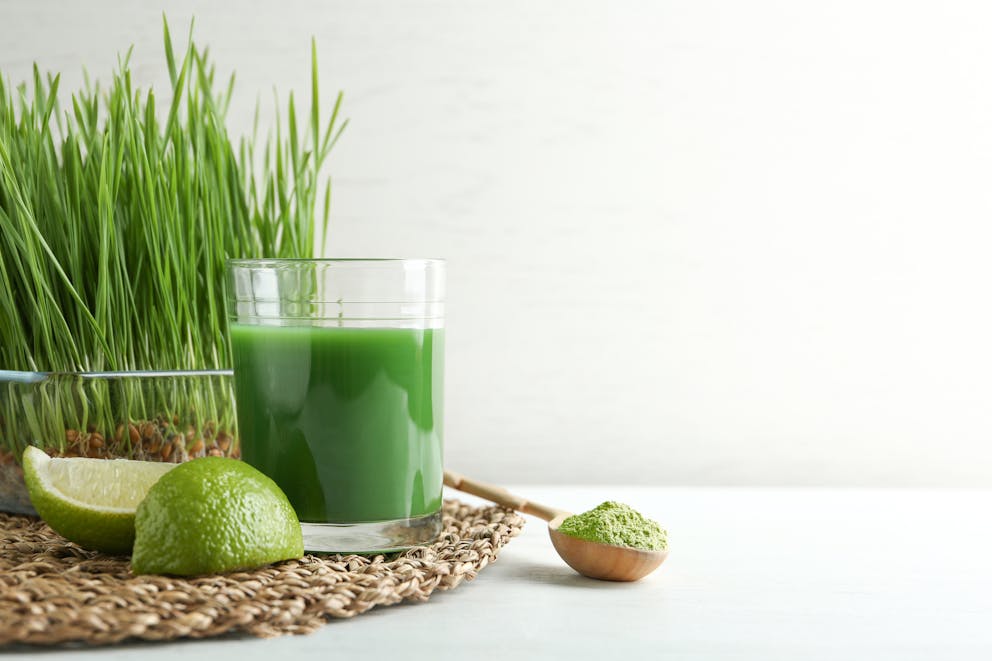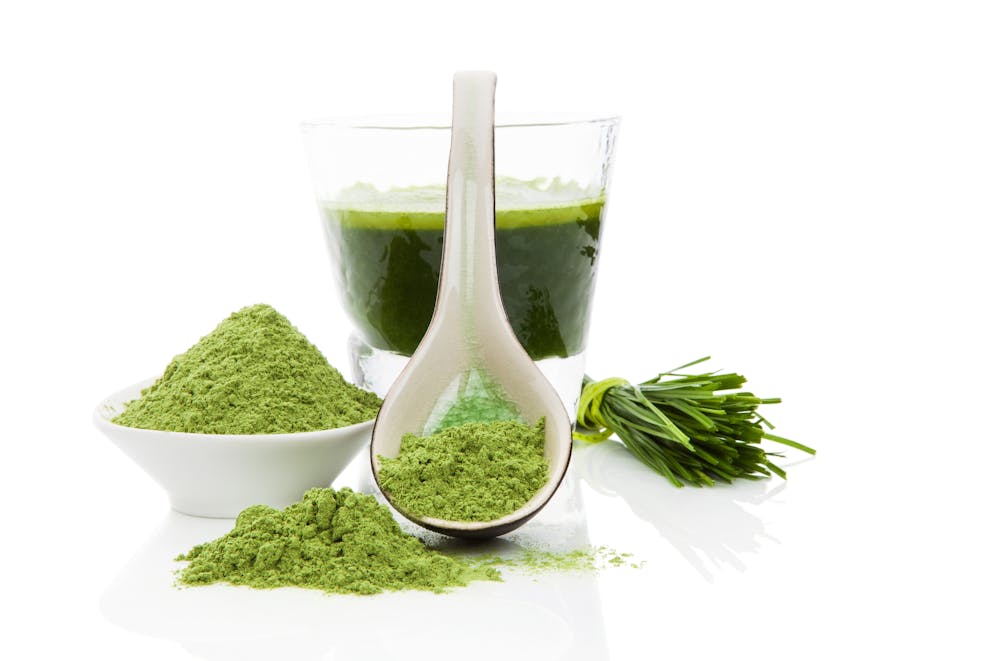Wheatgrass Powder vs. Wheatgrass Juice Powder

25 Top Supplements That Really Work
Discover the most effective supplements to promote a healthy body
Learn about key supplements to support digestion, brain function, energy, and more
Understand how to manage common health issues with specific supplements

25 Top Supplements That Really Work
Discover the most effective supplements to promote a healthy body
Learn about key supplements to support digestion, brain function, energy, and more
Understand how to manage common health issues with specific supplements

25 Top Supplements That Really Work
Discover the most effective supplements to promote a healthy body
Learn about key supplements to support digestion, brain function, energy, and more
Understand how to manage common health issues with specific supplements

25 Top Supplements That Really Work
Discover the most effective supplements to promote a healthy body
Learn about key supplements to support digestion, brain function, energy, and more
Understand how to manage common health issues with specific supplements

25 Top Supplements That Really Work
Discover the most effective supplements to promote a healthy body
Learn about key supplements to support digestion, brain function, energy, and more
Understand how to manage common health issues with specific supplements

25 Top Supplements That Really Work
Discover the most effective supplements to promote a healthy body
Learn about key supplements to support digestion, brain function, energy, and more
Understand how to manage common health issues with specific supplements

25 Top Supplements That Really Work
Discover the most effective supplements to promote a healthy body
Learn about key supplements to support digestion, brain function, energy, and more
Understand how to manage common health issues with specific supplements

25 Top Supplements That Really Work
Discover the most effective supplements to promote a healthy body
Learn about key supplements to support digestion, brain function, energy, and more
Understand how to manage common health issues with specific supplements

25 Top Supplements That Really Work
Discover the most effective supplements to promote a healthy body
Learn about key supplements to support digestion, brain function, energy, and more
Understand how to manage common health issues with specific supplements

25 Top Supplements That Really Work
Discover the most effective supplements to promote a healthy body
Learn about key supplements to support digestion, brain function, energy, and more
Understand how to manage common health issues with specific supplements

25 Top Supplements That Really Work
Discover the most effective supplements to promote a healthy body
Learn about key supplements to support digestion, brain function, energy, and more
Understand how to manage common health issues with specific supplements

25 Top Supplements That Really Work
Discover the most effective supplements to promote a healthy body
Learn about key supplements to support digestion, brain function, energy, and more
Understand how to manage common health issues with specific supplements

25 Top Supplements That Really Work
Discover the most effective supplements to promote a healthy body
Learn about key supplements to support digestion, brain function, energy, and more
Understand how to manage common health issues with specific supplements

25 Top Supplements That Really Work
Discover the most effective supplements to promote a healthy body
Learn about key supplements to support digestion, brain function, energy, and more
Understand how to manage common health issues with specific supplements
Wheatgrass powder vs. wheatgrass juice powder—what’s the difference, and which is better?
While wheatgrass powder contains essential vitamins, minerals, and fiber, wheatgrass juice powder is considered more nutritious and associated with many health benefits.
Here’s the difference between wheatgrass juice powder and wheatgrass powder, and why the juice powder form is generally considered the better choice.

What is wheatgrass powder?
Wheatgrass is an incredibly rich source of vitamins, minerals, essential amino acids, fiber, chlorophyll, and enzymes, and consuming fresh wheatgrass juice is an excellent way to support optimal nutrition and promote a healthy body.
However, juicing fresh wheatgrass is time-consuming and can be expensive, and wheatgrass powders, made by grinding dehydrated wheatgrass, offer a convenient alternative.
You can add raw wheatgrass powder, sometimes also called wheatgrass whole powder, to smoothies and shakes or simply mix it with water to prepare a wheatgrass juice drink.
Watch the video below to discover the difference between wheatgrass powder and wheatgrass juice powder.
Wheat Grass Juice vs Wheat Grass Juice Powder
What is wheatgrass juice powder?
Wheatgrass juice powder is made by juicing young wheatgrass shoots and then dehydrating the juice at low temperatures into a fine powder form to preserve the heat-sensitive nutrients and enzymes.
Because wheatgrass juice powder is made using only the juice, it doesn’t contain any indigestible fibers, making it a highly concentrated source of nutrients that are easily absorbed.
Wheatgrass juice powders tend to have a mild and pleasant flavor and are a popular dietary supplement widely available at health food stores and specialized online retailers.

Wheatgrass powder vs. wheatgrass juice powder
While both wheatgrass powder and wheatgrass juice powder are made from the young grass of the wheat plant, juice powder contains higher concentrations of critical nutrients, making it the more nutritious option.
Beverages made with wheatgrass powder often have a strong grassy flavor and a gritty texture due to the high fiber content, which can cause intestinal irritation in individuals with a sensitive digestive tract.
In contrast, wheatgrass juice powder doesn’t contain dietary fiber and mixes easily with fluids to make a smooth wheatgrass drink.
Wheatgrass juice is generally well tolerated and not associated with adverse health effects. However, wheatgrass products are at an increased risk of being cross-contaminated with gluten and wheat, which can be problematic for individuals with wheat allergies, Celiac disease, or gluten intolerance.
It’s crucial to seek medical care immediately if you experience symptoms of an allergic reaction, such as hives, rashes, swelling, or breathing difficulties after consuming wheatgrass juice.

Benefits of wheatgrass juice powder
Wheatgrass has impressive health benefits, which are primarily attributed to its high concentrations of essential nutrients.
Wheatgrass juice powder is a rich source of several nutrients, including:
Vitamin A
Vitamin C
B vitamins
Iron
Magnesium
Calcium
Potassium
Zinc
Selenium
Chlorophyll
Amino Acids
“Wheatgrass is a nutritional powerhouse that promotes optimal nutrition, supports cellular health and improves immune system functions,” explains Dr. Berg. “Regularly consuming wheatgrass juice is an excellent strategy to support a healthy body and lower the risk of various health issues.”
Wheatgrass is a rich source of chlorophyll, a green pigment that plays a crucial role in photosynthesis and has been linked to several health advantages, including a lower risk of cancer.
Research published in Molecules investigated chlorophyll's health effects and concluded, “Chlorophyll exhibits a wide range of benefits, including antioxidant, antimutagenic, antigenotoxic, anti-cancer, and anti-obesogenic activities.”
Consuming wheatgrass may be especially beneficial for individuals with intestinal issues such as inflammatory bowel disease (IBD), Crohn’s disease, ulcerative colitis, and irritable bowel syndrome (IBS).
A study published in Scandinavian Journal of Gastroenterology found that daily wheatgrass juice consumption was associated with a significant reduction in ulcerative colitis symptoms.
It’s believed that various polyphenols in wheatgrass have potent anti-inflammatory and antioxidant properties that can reduce intestinal inflammation and help improve digestion.
In addition, wheatgrass juice contains superoxide dismutase (SOD), a critical antioxidant enzyme that protects cells from oxidative stress and inflammation.
Inadequate cellular SOD concentrations are linked to poor cell functions and chronic inflammation and can increase the risk of heart disease, cancer, neurological issues, and premature aging.
Moreover, wheatgrass juice consumption has been found to promote metabolic health and may help prevent insulin resistance and chronically elevated blood sugar, the leading causes of type 2 diabetes.
Evidence published in Toxicology and Industrial Health found that wheatgrass juice has blood-sugar-lowering effects and has the potential to reverse signs of diabetes.
Although more research is needed to confirm the link between wheatgrass and metabolic health, it’s believed that wheatgrass juice's digestive-enhancing, anti-inflammatory, and antioxidant properties support blood sugar regulation and promote balanced insulin levels.

Key takeaways
Wheatgrass powder vs. wheatgrass juice powder—which one is better?
Because wheatgrass juice powder is made by dehydrating fresh wheatgrass juice, it contains significantly higher concentrations of nutrients than wheatgrass powder derived from powdered wheatgrass shoots.
Wheatgrass is an incredibly rich source of essential nutrients, chlorophyll, amino acids, and enzymes, and regular consumption can promote cellular health and digestive functions, reduce inflammation, support strong immune defenses, and may lower the risk of cancer and diabetes.
FAQ
1. Wheatgrass powder vs. wheatgrass juice powder: what’s the difference?
Wheatgrass powder is made from dehydrated wheatgrass that has been ground into a powder.
In contrast, wheatgrass juice powder is made by juicing fresh wheatgrass shots and then drying the juice at low temperatures to create a fine powder.
2. What is the best form of wheatgrass?
Wheatgrass juice powder contains higher concentrations of essential nutrients, including vitamins, minerals, amino acids, chlorophyll, and enzymes.
Not only is wheatgrass juice powder more nutritious than wheatgrass powder, but it also tends to have a more pleasant taste and is less likely to cause digestive issues.
3. What's the difference between wheatgrass and wheat?
Wheatgrass refers to the highly nutritious young shoots of the wheat plant, which are typically harvested before it begins to produce grains.
Wheat refers to the mature grains of the wheat plant, which are rich in carbohydrates and used as a staple crop for flour production and livestock feed.
4. What are the benefits of wheatgrass juice?
Wheatgrass juice is a rich source of essential nutrients, and regular consumption of wheatgrass is associated with improved digestive health, better blood sugar control, and strong immune defenses.
In addition, wheatgrass juice has anti-inflammatory and antioxidant properties that help lower the risk of chronic inflammation, heart disease, and metabolic syndrome.
5. How much wheatgrass does it take to make a cup of wheatgrass juice?
It takes around 8.5 ounces (250 grams) of fresh wheatgrass to make one cup (240 milliliter) of wheatgrass juice.
6. Can you have wheatgrass juice on keto?
Yes, wheatgrass juice is keto-friendly.
However, carefully check the nutrition label of the wheatgrass juice powder you plan to use and avoid products with added sugars, which can interfere with fat burning and may kick you out of ketosis.
6. Who should not drink wheatgrass juice?
Although wheatgrass juice doesn’t contain gluten, it’s at a high risk of cross-contamination, and individuals with gluten intolerance, wheat allergies, or Celiac disease should avoid wheatgrass juice or opt for a wheatgrass juice powder that has been certified as gluten-free.
Sources
Previous blog
Get Rid of Pain After Gallbladder SurgeryNext blog
Hot Flashes and Menopause ChangesTags

Popular
08/21/2024
55.7K views
02/23/2025
46.8K views
11/18/2024
281.1K views
03/18/2024
11/21/2022




